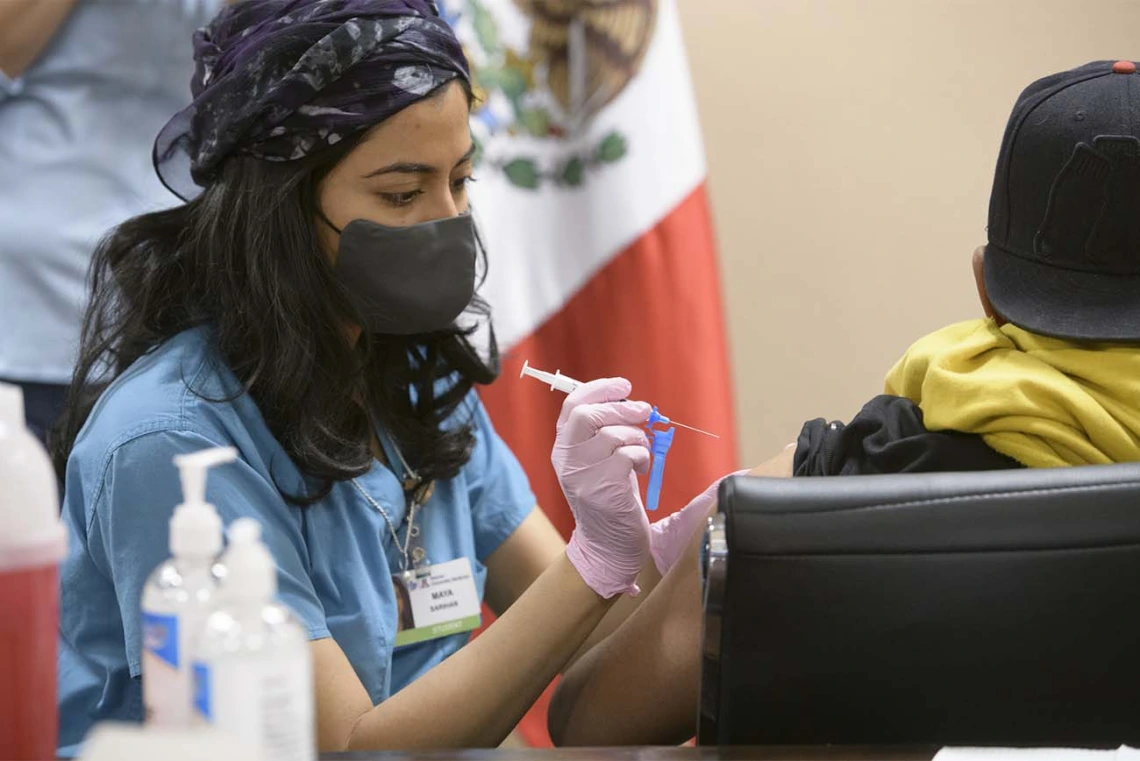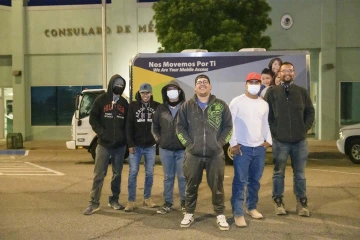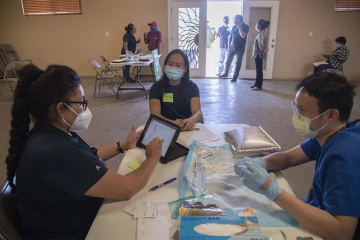UArizona Health Sciences Partnership to Vaccinate Hard-to-reach Communities Expands in Southern Arizona
A new mobile health unit program is getting more vaccines in the arms of rural, Hispanic and other hard-to-reach populations in southern Arizona.

College of Medicine – Tucson senior medical student Maya Sarihan gives a COVID-19 vaccination to an agricultural laborer April 23 during a MOVE UP clinic at the Mexican Consulate in Douglas, Arizona.
A coordinated University of Arizona Health Sciences effort to get the COVID-19 vaccine to hard-to-reach communities in Arizona has expanded to southern Arizona as part of the Mobile Outreach Vaccination and Education for Underserved Populations (MOVE UP) program.

From left: Oscar Moreno, Mara Rodriguez, Jairo Lopez, Ruben Sosa, Nestor Quiñonez and Jesús Pérez, farm workers from the Agua Prieta, Mexico, area, gather before sunrise at the Consulate General of Mexico in Douglas for a COVID-19 vaccine clinic.
“MOVE UP’s overarching goal is to reach people in communities who won’t go to the big vaccine PODs because they have transportation issues, they have language issues, they have technology issues,” said Cecilia Rosales, MD, MS, associate dean of Phoenix programs as well as community outreach and engagement at the UArizona Mel and Enid Zuckerman College of Public Health.
A second MOVE UP vaccine clinic was held April 28 at the Consulate of Mexico in Nogales, Arizona, in partnership with the Santa Cruz County Health Department. It focused on vaccinating truck drivers who transport produce across the border.

Cecilia Rosales, MD, and Sheila Soto review packaging for the COVID-19 vaccines to be administered at a MOVE UP clinic.
It’s anticipated the MOVE UP initiative soon will be running three to four mobile vaccine clinics a week, including at community centers, schools, and senior housing and long-term care facilities. These clinics are staffed by faculty and student volunteers from the College of Medicine - Tucson, College of Medicine - Phoenix, College of Nursing and College of Pharmacy, as well as staff and volunteers from the College of Public Health.
“For us in southern Arizona, we know the barriers to access health care are different than in urban areas like Phoenix and Tucson. Traveling is more difficult – you can’t just catch a bus,” said Sheila Soto, MPH, program manager for the Primary Prevention Mobile Health Unit based in Tucson. “People can’t always leave work to go get a vaccine between 8 a.m. and 5 p.m. We are targeting those who work those hours when most of the vaccination events typically take place.”
But, Soto added, these clinics aren’t just for administering vaccines. They also include the mobile health unit’s standard health screenings for blood pressure, cholesterol, diabetes and body mass index, along with referrals for cardiovascular, respiratory and other medical conditions.
“I'm really excited about MOVE UP,” Soto said. “This is the community we've been serving the last several years. We’re people they know and trust. We got calls, especially when vaccines were first rolled out, from people checking to see where the vaccinations were and should they get them. I think that will make a difference, especially in rural areas.”

Maria Jaime, a health educator with the UArizona College of Public Health in Phoenix, goes through a patient’s answers on her registration for a COVID-19 vaccine, while Alvin Wong, DO, clinical associate professor of internal medicine with the UArizona College of Medicine – Phoenix, prepares her shot.
“This is the first time our mobile health program has done something like this, so it’s been helpful to work together. I think it'll be a beneficial partnership. And we'll meet a need for our rural communities to get the vaccine out there,” Sorenson said.
To inquire about general vaccine scheduling at future MOVE UP events, contact Soto at ssoto2@arizona.edu or 520-251-8418.
Contact
David Mogollon
520-275-6931
mogollon@arizona.edu

